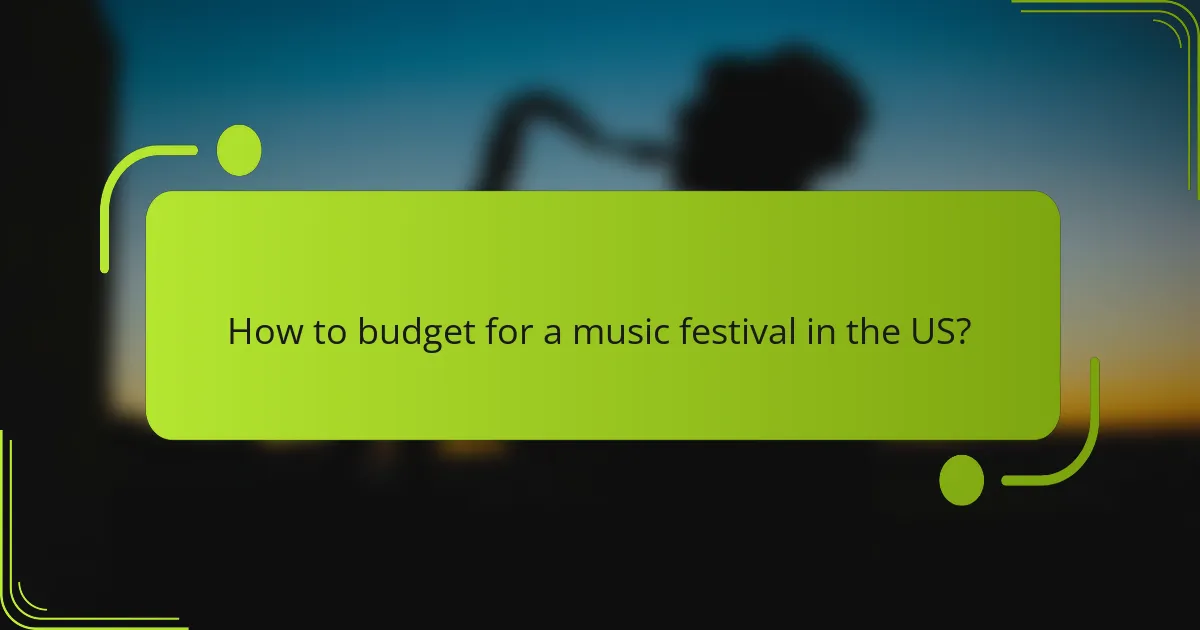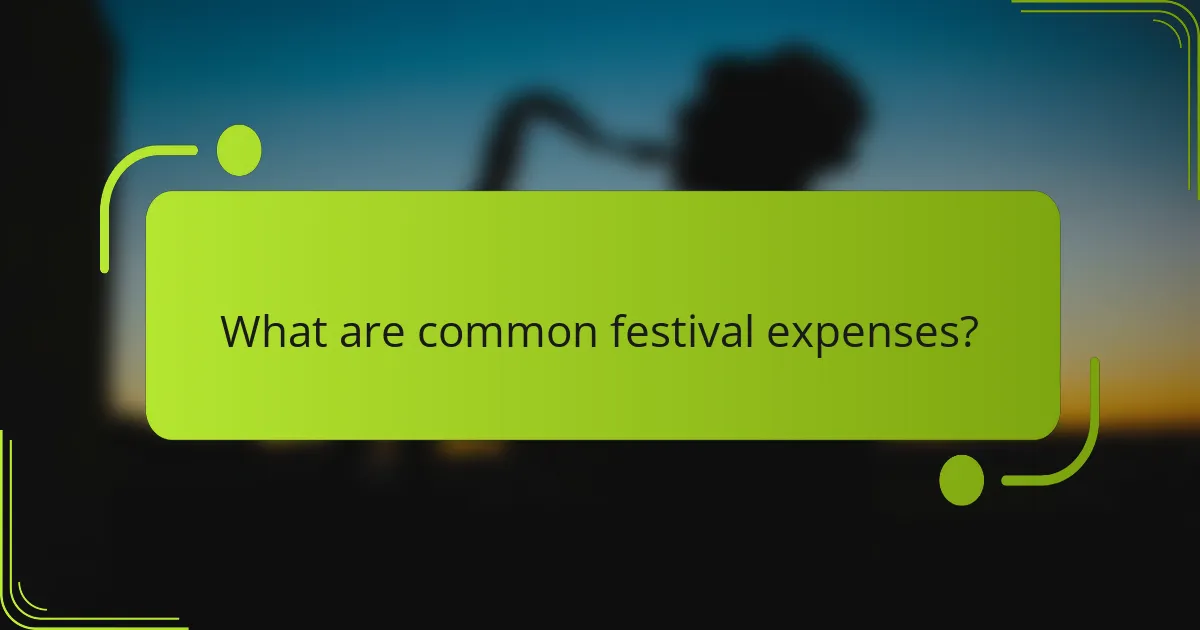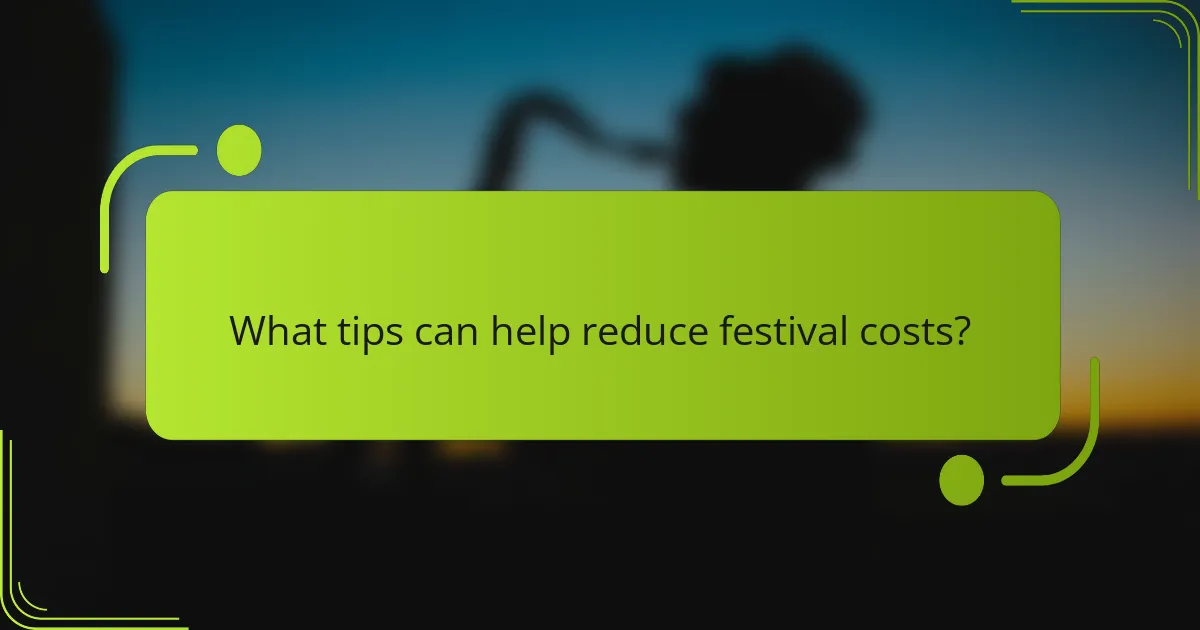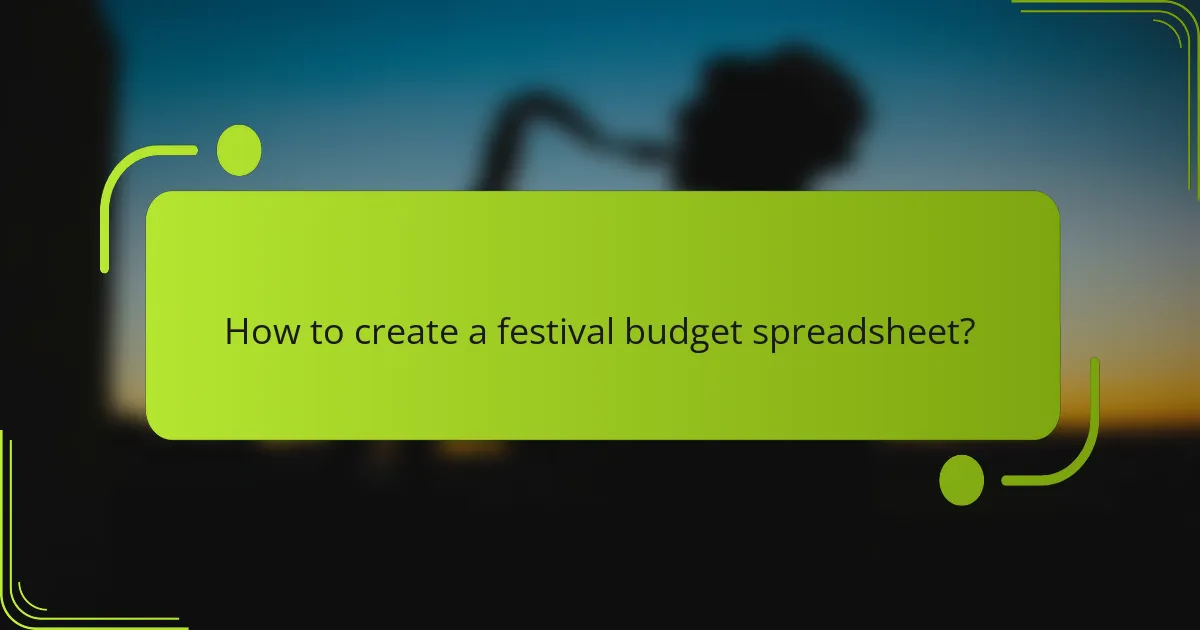Budgeting for a music festival is essential for an enjoyable experience without financial stress. By estimating costs such as tickets, travel, accommodation, and food, you can create a comprehensive budget that covers all expenses. Planning ahead and utilizing discounts can further help in managing your festival costs effectively.

How to budget for a music festival in the US?
Budgeting for a music festival in the US involves estimating various costs, including tickets, travel, accommodation, food, and merchandise. A well-planned budget helps ensure you enjoy the festival without overspending or facing unexpected expenses.
Estimate ticket costs
Ticket prices for music festivals can vary widely, typically ranging from around $100 to several hundred dollars, depending on the event’s popularity and location. Early bird tickets often offer significant savings, so purchasing them as soon as they become available can be beneficial.
Consider additional fees such as service charges and parking costs when budgeting for tickets. Always check the festival’s official website for the most accurate pricing and any available discounts.
Calculate travel expenses
Travel expenses can include gas, airfare, or public transportation costs. If driving, estimate fuel costs based on your vehicle’s mileage and current gas prices, which can fluctuate significantly across the US.
For flights, consider booking in advance to secure better rates. Additionally, factor in transportation to and from the festival venue, such as rideshares or shuttle services, which can add to your overall travel budget.
Plan accommodation costs
Accommodation options range from hotels and motels to camping at the festival site. Hotel prices can vary from $100 to over $300 per night, depending on proximity to the venue and demand.
If camping, check if the festival provides camping facilities and what the associated costs are. Booking accommodations early can help you secure better rates and availability.
Include food and drink budget
Food and drink expenses at festivals can add up quickly, with prices often higher than typical local rates. Budget around $10 to $20 per meal, depending on the festival’s offerings and your preferences.
Consider bringing snacks and refillable water bottles to save money. Some festivals allow outside food and drinks, but be sure to check their specific regulations to avoid any issues.
Account for merchandise purchases
Merchandise, such as band T-shirts and memorabilia, can be tempting but may significantly impact your budget. Set a specific amount for merchandise, typically ranging from $20 to $100, to avoid overspending.
Research the festival’s merchandise options in advance to prioritize what you really want. Keep in mind that some items may sell out quickly, so having a budget will help you make informed decisions while shopping.

What are common festival expenses?
Common festival expenses include ticket prices, transportation fees, lodging costs, food and beverage expenses, and additional activities. Understanding these costs helps in creating a comprehensive budget to ensure a smooth festival experience.
Ticket prices
Ticket prices are often the largest upfront cost for festival-goers. Depending on the festival’s popularity and location, prices can range from low tens of dollars for smaller events to several hundred dollars for major festivals. Early bird tickets usually offer significant savings, so purchasing in advance is advisable.
Be aware of additional fees that may apply, such as service charges or processing fees. Always check the festival’s official website for the most accurate pricing and any available discounts.
Transportation fees
Transportation fees can vary widely based on your location and mode of travel. If you’re driving, consider costs for gas, parking, and tolls. Public transportation options, such as buses or trains, may offer more economical choices, especially in urban areas.
For those flying in, factor in airfare and potential shuttle services to the festival site. Booking transportation early can often yield better rates, so plan ahead to avoid last-minute expenses.
Lodging costs
Lodging costs can significantly impact your festival budget, especially if the event spans multiple days. Options range from camping on-site, which is often the most affordable, to hotels that can vary from budget-friendly to luxury accommodations.
Consider booking accommodations well in advance, as prices tend to rise as the festival date approaches. Look for group discounts or shared accommodations to reduce costs.
Food and beverage expenses
Food and beverage expenses at festivals can add up quickly. Prices for meals and drinks on-site are typically higher than average, so budgeting for these costs is essential. Expect to pay anywhere from a few dollars for snacks to over twenty dollars for full meals.
To save money, consider bringing your own snacks or meals if the festival allows it. Some festivals offer meal packages that can be more economical than purchasing food individually.
Additional activities and experiences
Many festivals offer additional activities and experiences that may require extra fees. These can include workshops, VIP access, or special performances. Prices for these experiences can range from modest fees to substantial amounts, depending on the exclusivity and nature of the activity.
Before committing, evaluate which additional experiences are worth the investment based on your interests. Set a budget for extras to avoid overspending while still enjoying the festival to its fullest.

What tips can help reduce festival costs?
To effectively reduce festival costs, consider planning ahead and taking advantage of available discounts. Simple strategies like buying tickets early and organizing group purchases can lead to significant savings.
Buy tickets early
Purchasing festival tickets well in advance often results in lower prices. Many festivals offer early bird pricing, which can save you a considerable amount compared to last-minute purchases.
Additionally, early ticket buyers may gain access to exclusive perks, such as preferred camping spots or VIP experiences. Keep an eye on ticket release dates and set reminders to ensure you don’t miss out.
Use group discounts
Many festivals provide group discounts for larger parties, which can significantly reduce the cost per person. Check the festival’s website for details on how many attendees are required to qualify for these discounts.
When planning with friends, coordinate ticket purchases to maximize savings. Consider using a single payment method to streamline the process and ensure everyone benefits from the group rate.
Plan meals in advance
Food costs at festivals can add up quickly, so planning meals ahead of time can help you manage expenses. Consider packing your own snacks and meals to reduce reliance on pricey festival vendors.
If you prefer to eat out, research food options and prices beforehand. Look for local eateries that offer discounts or special deals for festival-goers, which can provide a more affordable dining experience.
Utilize public transportation
Using public transportation to reach the festival can save on parking fees and fuel costs. Many cities offer convenient transit options that are often more economical than driving.
Check for any special transit services provided by the festival, such as shuttles from major hubs. This can also alleviate the stress of navigating traffic and finding parking during busy festival days.
Consider camping options
Camping at the festival site can be a cost-effective accommodation choice. Many festivals offer camping passes that are cheaper than nearby hotels or rentals.
When selecting a camping option, consider the amenities provided, such as showers and restrooms, as well as the proximity to the festival grounds. Bringing your own camping gear can further reduce expenses, making it a practical choice for budget-conscious attendees.

How to create a festival budget spreadsheet?
Creating a festival budget spreadsheet involves outlining all potential costs and tracking expenses to ensure you stay within your financial limits. A well-structured spreadsheet helps you manage funds effectively, making it easier to allocate resources for various festival elements.
Identify all expense categories
Start by listing all potential expense categories relevant to your festival. Common categories include venue rental, permits, equipment, staffing, marketing, and entertainment. Each category should encompass all possible costs to provide a comprehensive view of your budget.
Consider breaking down larger categories into subcategories for more detailed tracking. For example, under entertainment, you might include performers, sound equipment, and staging. This granularity helps in identifying specific areas where you can cut costs if necessary.
Use budgeting software like Excel
Utilizing budgeting software such as Excel allows for easy organization and calculation of your festival budget. Excel’s built-in formulas can automate calculations, helping you quickly assess total costs and remaining funds. Templates are also available online to simplify the setup process.
Ensure your spreadsheet includes columns for estimated costs, actual costs, and variances. This setup enables you to compare planned versus actual spending, making it easier to adjust your budget as needed throughout the planning process.
Track expenses in real-time
Real-time tracking of expenses is crucial for staying on budget during festival planning. Regularly update your spreadsheet with actual costs as they occur, which helps you identify any discrepancies between your estimates and actual spending.
Consider using mobile apps or cloud-based solutions that allow you to input expenses on the go. This practice ensures that you capture all costs promptly, reducing the risk of overspending or missing critical budget updates.

What are the benefits of budgeting for festivals?
Budgeting for festivals helps you manage your finances effectively, ensuring you enjoy the event without financial stress. It allows you to allocate funds wisely, prioritize spending, and avoid unexpected costs.
Prevents overspending
Creating a budget for a festival is essential to prevent overspending, which can quickly derail your financial plans. By setting a clear spending limit for categories such as tickets, food, accommodations, and merchandise, you can keep your expenses in check.
Consider breaking down your budget into specific areas. For example, allocate around 30-40% for tickets, 20-30% for food and drinks, and the remainder for travel and souvenirs. This way, you can monitor your spending in real-time and adjust as necessary.
To avoid common pitfalls, track your expenses daily during the festival. Use budgeting apps or simple spreadsheets to log purchases. This practice helps you stay aware of your spending habits and ensures you stick to your budget. Remember, it’s better to plan for a few extra expenses than to be caught off guard by unexpected costs.


